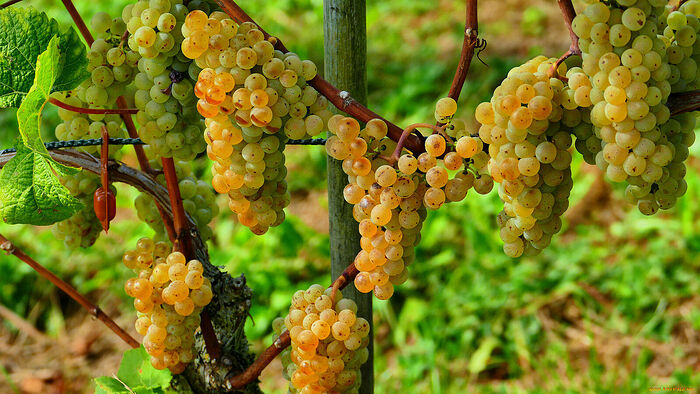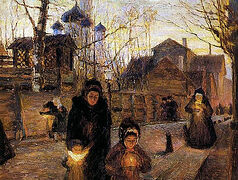Today, beloved brethren, three parables were read at the morning divine service. The first was about a barren fig tree. The second was about a father who had two sons. One son, to the father’s request, “child, go today, work in my vineyard,” answered, “I don’t want to,” and then came to his senses and went. The other, to whom he made the same request, said, “I’m going,” and did not go. And finally, the third parable is about a householder who, having a vineyard, surrounded it with a fence, dug a winepress in it, built a tower, let it out to the workers, and left. Then when the time came for the gathering of fruits, he sent his servants to the workers of the vineyard to receive the fruits. The workers bitterly beat some of the servants, killed others, and finally killed His Only Begotten Son (Mt. 21:17-44). Now let’s talk about the first parable.
Having spent the night in the village of Bethany, in the morning the Lord, says the evangelist Matthew, returning to the city of Jerusalem, was hungry; and when he saw a fig tree on the way, he went up to it and, finding nothing on it but some leaves, he said to it: Let there be no fruit from you forever. And the fig tree immediately withered. When the disciples saw this, they were surprised and said: how did the fig tree suddenly wither? But Jesus answered and said to them, Verily I say to you, if you have faith and do not doubt, you will not only do what was done to the fig tree, but if you also say to this mountain, "Rise up and be cast into the sea, it will happen; and whatever you ask in prayer with faith, you will receive.
A barren fig tree on the road with only leaves—that is me and you, beloved brother and sister. The Lord Jesus Christ, who is hungry for our salvation, often comes to us, sooner or later, to satisfy the joy of our soul, to become the bread of life for it. And, alas, he almost always finds in us only cares about everyday things—only leaves; the fruits of faith, all-powerful care for the salvation of our souls, are not there. And yet, each of us is planted on earth in order to bring forth spiritual fruits.
What kind of fruits in particular should each person, especially a Christian, bring? To this the holy Apostle answers as follows: The fruit of the spirit is love, joy, peace, long-suffering, mercy, faith (Gal. 5:22). Here, brothers and sisters, are the fruits that we must surely bring to the Planter of our life, the Lord Jesus, every day. Now look everyone. Are you a fertile fig tree or a barren one? If you are fertile, well, move forward; bring more and more fruits to the Lord, so that He will feed you with them in eternity; if you are barren, tremble, for you are threatened by the curse of the Lord of your life, and maybe very soon He will say to you: Let there be no fruit from you forever. And you will immediately wither; all your spiritual powers will die out; you will run out of faith, hope and love altogether—and every tree that does not produce good fruit is cut down and swept into eternal fire (Mt. 3:10). These words are true and clear as day. They will be fulfilled immutably, for heaven and earth will pass away, as days, months, and years pass by, but the words of the Lord will not pass away (cf. Mk. 13:31).
So, brothers and sisters, ask yourself: Do you bring the fruits of good deeds to the Lord of your belly every day? And most importantly, do you have the queen of virtues—love—fervent love for your Creator and love for your neighbor as for yourself? The Holy Apostle Paul will answer you for me: Love is long-suffering, merciful, love does not envy, love does not exalt itself, is not proud, does not behave unseemly, does not seek its own, is not irritated, does not think evil, does not rejoice in unrighteousness, but rejoices in the truth. Covers everything, believes everything, hopes everything, endures everything. Love never ceases. Love is so necessary for a Christian that if even he speaks in all human and angelic languages, but does not have love, then he is like a ringing brass, with all his eloquence and verbosity, or like a sounding cymbal. Even if he has the gift of prophecy and knows all the secrets and meaning of all the scriptures, and even, what is most amazing, if he has all the faith it takes for mountains to move from place to place at his word, yet he has no love, then he is nothing—all his knowledge, all his labors without love are in vain (1 Cor. 13:1–8). Why is love so necessary for us? Because God Himself is love (1 Jn. 4:8), and we are created in His image; and because God resides in the Christian. Do you not know that Christ is in you? Is it that you do not know how to eat? (2 Cor. 13:5) Do you not know that you are the temple of God and that the Holy Spirit lives in you (1 Cor. 3:16)?
Whoever has a fervent love for God and neighbor has in his soul other fruits, numbered by the Apostle, joy in the Holy Spirit, peace, long-suffering, goodness, mercy, faith. For in love, as in a seed, all virtues are contained—for where there is love, there is God, all-perfect perfection, genuine kindness, infinite goodness, infinite omnipotence. Whoever has fervent love for God also has such faith that he can move mountains, as the Lord said: And whatever he asks in prayer with faith, he will receive (cf. Mt. 21:22).
So, if we do not want to dry up like a fig tree cursed by the Lord or like grass, and be thrown into the eternal fire, let us try, beloved brethren, to bring the fruits of good deeds to the Planter of our life, while we have the time, strength, means, and opportunity. Perhaps a time will come when we would like to do good, but it will be impossible. So, as long as there is time, let us do good to everyone, and especially to those of our own by faith (Gal. 6:10). Amen.




